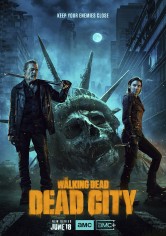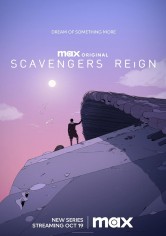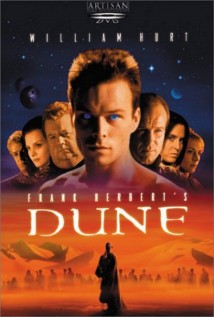Rayting:
7.0/
10 21K votes
Language: English
A three part miniseries on politics, betrayal, lust, greed and the coming of a Messiah. Based on Frank Herbert's classic science fiction novel.
Episode Guide
Best Dune Episodes
Similar Series
8.6

Special OPS
9.0

Bleach: Thousand-Year Blood War
7.1

The Walking Dead: Dead City
8.6

Scavengers Reign


User Reviews
Watchseries; Jon Harrison's version of Dune isn't exactly what you'd expect from a SciFi TV Miniseries...but it's a SciFi TV Miniseries. Much like British Masterpiece Theater, you'd swear they got actors out of college trying to fill a work quota. The acting is Shakespeare in the Park levels of bland with all the pageantry of a repertory theater. William Hurt doesn't help considering his acting has always been bland. He even looks bored in the Marvel movies. There clearly isn't a single frame of this filmed outside, and every single desert scene looks green-screened. The costume design literally makes this look like a college project. No effort is made to produce makeup effects. On the plus side, they used actual contact lenses instead of roto-scoping for the Melange infused eyes. It wasn't the best way to do it since the camera has trouble seeing it in bright light, but it's a far superior way to do it than the other version of Dune did. So, points for that decision! That is a SciFi/SyFy TV mini-series, which means we can forgive most this. It's not as bad as most SciFi/SyFy TV productions. I've seen worse acting worst productions, so let's get into why I rated this at 7 out of 10 instead of 3 (which the acting absolutely deserves).
First, let me get the good things about the acting out of the way. For all of my riding on how rehearsed and bland the acting sounds, they aren't actually bad, and we do get to see who the better actors are, like Julie Cox's Irulan, who was absolutely a stand out performance. Giancarlo Giannini was thoroughly convincing as the Padishaw-Emperor Shadam IV. In fact, I get the feeling that all of the scenes with Irulan's education and trying to solve the mystery of Muad'dib (which absolutely were not in any version of the book) were only added so that we could see more of Julie Cox's performance. It was a good choice. Giancarlo's Emperor gets a few extra scenes out of this, too, though not as many as Cox. These two are definitely a bright point in this production. Barbara Kordetova's Chani also stands out, but this might not be a good thing as she consistently outstages Alec Newman's Paul Atreides/Muad'dib. A lot of people will point to Ian McNiece's Baron Harkonnen, but I don't see it. While he's definitely chewing the scenery, if nothing else, I actually get the strongest rep theater, low-rent vibe from his performance. It doesn't help that he actually frequently breaks the fourth wall and talks directly to the audience repeatedly. I know that's the director's fault and that it's done for theatrical effect, but it does nothing to improve my view of the acting in this production. Miroslav Taborsky's Fenring was...an interesting performance. I don't know if it could be called good, but it definitely was memorable. He also appears in most of the extra scenes with Irulan, but I didn't find his performance particularly likable. He used a strange set of vocal ticks and hand motions for his performance that I suspect was intended to indicate that there is an inherent strangeness to the character (if you've read the books, you can probably see what he was trying to do), but I really don't think it worked. I think if he had a bit more time to perfect this performance it might have been something very special. Unfortunately, it just doesn't land.
Now, onto set design. I've already mentioned that this movie has had the greenscreened out of it, and not very well. Regardless, t
Jon Harrison's version of Dune isn't exactly what you'd expect from a SciFi TV Miniseries...but it's a SciFi TV Miniseries. Much like British Masterpiece Theater, you'd swear they got actors out of college trying to fill a work quota. The acting is Shakespeare in the Park levels of bland with all the pageantry of a repertory theater. William Hurt doesn't help considering his acting has always been bland. He even looks bored in the Marvel movies. There clearly isn't a single frame of this filmed outside, and every single desert scene looks green-screened. The costume design literally makes this look like a college project. No effort is made to produce makeup effects. On the plus side, they used actual contact lenses instead of roto-scoping for the Melange infused eyes. It wasn't the best way to do it since the camera has trouble seeing it in bright light, but it's a far superior way to do it than the other version of Dune did. So, points for that decision! That is a SciFi/SyFy TV mini-series, which means we can forgive most this. It's not as bad as most SciFi/SyFy TV productions. I've seen worse acting worst productions, so let's get into why I rated this at 7 out of 10 instead of 3 (which the acting absolutely deserves).
First, let me get the good things about the acting out of the way. For all of my riding on how rehearsed and bland the acting sounds, they aren't actually bad, and we do get to see who the better actors are, like Julie Cox's Irulan, who was absolutely a stand out performance. Giancarlo Giannini was thoroughly convincing as the Padishaw-Emperor Shadam IV. In fact, I get the feeling that all of the scenes with Irulan's education and trying to solve the mystery of Muad'dib (which absolutely were not in any version of the book) were only added so that we could see more of Julie Cox's performance. It was a good choice. Giancarlo's Emperor gets a few extra scenes out of this, too, though not as many as Cox. These two are definitely a bright point in this production. Barbara Kordetova's Chani also stands out, but this might not be a good thing as she consistently outstages Alec Newman's Paul Atreides/Muad'dib. A lot of people will point to Ian McNiece's Baron Harkonnen, but I don't see it. While he's definitely chewing the scenery, if nothing else, I actually get the strongest rep theater, low-rent vibe from his performance. It doesn't help that he actually frequently breaks the fourth wall and talks directly to the audience repeatedly. I know that's the director's fault and that it's done for theatrical effect, but it does nothing to improve my view of the acting in this production. Miroslav Taborsky's Fenring was...an interesting performance. I don't know if it could be called good, but it definitely was memorable. He also appears in most of the extra scenes with Irulan, but I didn't find his performance particularly likable. He used a strange set of vocal ticks and hand motions for his performance that I suspect was intended to indicate that there is an inherent strangeness to the character (if you've read the books, you can probably see what he was trying to do), but I really don't think it worked. I think if he had a bit more time to perfect this performance it might have been something very special. Unfortunately, it just doesn't land.
Now, onto set design. I've already mentioned that this movie has had the greenscreened out of it, and not very well. Regardless, t
Dune watchseries. First, a small catalog of guidelines for the 3 main types of viewers, and what they can expect from this mini series.
Type One: The Dunatics. For them, nothing can match up to the gospel according to Frank Herbert, so, choices are reduced to 2. Either make allowances towards both limitations and possibilities of the TV format to encounter the new and frivolous concept of fun, or refuse to watch this on the premise that any cinematic adaptation short of congeniality amounts to blasphemy by nature.
Type Two: The Lynch Mob. For them, the 84 adaptation justifies making allowances towards the novel by sheer impact of Lynch's surely unique, but also highly controversial vision - sometimes even questionable, where both Herbert and Lynch share an uncomfortable leaning towards social Darwinism and Riefenstahl-type aesthetics/ideals of 'Uebermensch' and 'Untermensch', sometimes even drifting into fascist cyphers. Noble savages versus the pit full of rotting (and of course 'sexually depraved', by showing the 'classic' negatively coded combination of cruelty and latent/outright homosexuality in men, and deception/treachery and offensive sexuality in women) carcass of the old and degenerated system of the imperial hierarchy. But the belief in 'higher breeding' (birthright of leadership/superiority) transcends both and is never put in question - not even by our 'hero' after the real necessity of a political marriage was gone. Recommendation: Watch Dune 2000. With a certain selective view applied, it'll serve as a welcome spare parts depot for their thesis that the 84 movie casts a shadow which can't be shed by any future attempt. Visually, this new version has enough thinly disguised 'Lynchisms' to justify a gloat session.
Type Three: The Players. They are the least dogmatic section of viewers, first and foremost on the look-out for 5 hours of 'other-worldly' atmosphere and storytelling beyond the mind-numbing standards of SF TV. Recommendation: Have fun and a few good 'goosebump moments' beyond mere popcorn TV.
General aspects:
Looks Let's face it, this one is split. The photography, costumes (matter of taste) and the built sets are excellent but highly individual. One either loves or hates it. On the whole, it looks more like a Visconti epic than Hollywood coded SF. CGI, backdrops, matte paintings and 'outdoor' studio sets, on the other hand, are so unbelievably clumsy and unprofessional that they can easily spoil the whole thing if one isn't capable of blotting them out of one's prime perception. The budget is no excuse. Half a crew from the minimal budget wizards on Farscape would've finished classes above this shambles.
Script This is far better than most give it credit. It has flaws, but they derive mostly from particular expectations of the Dunatics or the Lynch Mob. They tried to loose a bit of the extremely sterile and formalized dialogue from the books and the 84 movie - sometimes going overboard by making them talk too '90's casual' - but on the whole achieving a good compromise between Herbert's and Lynch's extremely artificial diction and something that could be recognized as 'normal' talk in such a highly ritualized environment. On the whole, they stayed closer to the book than the Lynch version, but messed up on a few small but sometimes vital details without an apparent reason. That's of no consequence for those who haven't read the orig
I was wondering if I needed to wait until viewing the entire mini-series version of Frank Herbert's seminal science fiction classic, but now having seen Part One, I know that won't be necessary.
How I wish there were some way to extract the charisma of the movie's cast, and somehow meld it with the production values and plotline of the new version. That way, fans of this sprawling allegorical tale could have the best of both worlds. Not that there aren't admirable things about both versions.
Where the magnificent photography of the late, great Freddie Francis served well David Lynch's more ethereal tendencies in the 1984 version, Vittorio Storaro's cleaner, clearer images for Harrison's miniseries could very well be a metaphorical reflection of the ever-expanding vision of its hero, young Paul Atreides (nee Paul Mu'ad D'ib.) The production design of both films is lavish, but where Lynch's film gave locations and accoutrements a more lived-in look, the mini's similar designs, though equally accurate by the novel's standards, reflect that antiseptic cleanliness that we are learning to recognize more and more with the advent of digital technology and its application to cinematic visual techniques.
With a few exceptions, the casting and therefore the subsequent performances are just as clean and clear-cut, dispensing with some of the character's humanity in exchange for the original's hystrionics of its more memorable characters.
Where Kenneth McMillan's unredeemably repulsive yet completely unforgettable Baron Harkonnen was the apex of pustulant, corpulent evil, Ian McNeice's version comes off as daintily perturbed, as if the most upsetting event in his worldview is not being served tea on time. William Hurt and Saskia Reeves capture the confident, manor-bred mantles of Duke Leto and the Lady Jessica accurately enough, but gone are the sorrowful grace of Jurgen Prochnow and the stunning Francesca Annis, whose relationship seemed tinged with the inescapable taint of a prophecy waiting to be fulfilled, and the damned, doomed parts they both played in its unfolding.
The rest of the cast, though gamely essaying their roles to the best of their ability, could hardly hope to match the powerhouse ensemble assembled by Italian mega-mogul Dino de Laurentis. For years, David Lynch was wrongfully assigned the blame for butchering his own film, when buffs everywhere know that he suffered through the ham-handed, studio-supervised editing of what should've been a landmark of science-fiction filmmaking, similar to what Terry Gilliam would endure at the same studio with BRAZIL.
Further insult was added to the injury when a four-hour cut was assembled by Universal for the TV version, which Lynch promptly removed his name from, (hence the traditional "Smithee" credit for direction, and the writing by "Judas Booth.")
While it is a splendid example of how CGI and other visual technological developments are making it possible for filmmakers to maintain accuracy and a truth to tell those stories it would've been impossible to film over a decade ago, (and for about half the cost), I for one do miss the star power and (at least) some of the remarkable acting in the Lynch version. I suspect where more money was spent on securing stars in '84 than for the sets and costume designs, the exact opposite is true for the new miniseries.
New and old fans of the tale should view and enjoy the latest versio
I consider Frank Herbert's "Dune" to be the greatest science fiction novel of all time. Others would disagree, but they would have to admit that it is up there, even if it isn't their #1. I'm not talking about the whole book series, I'm just talking about the original novel. So I'm a serious fan of the material.
The 1984 film adaptation was an abortion. The depth of this novel cannot be conveyed in a two hour film, and David Lynch was badly undercut by the producers, who changed things to match their own desires. In its defense, however, it contained very high production values, lavish production design, a stellar cast, and much incredible visual imagery that sticks in the mind. If you can just try to forget that rain falls on Arrakis at the end (without reason), the rock group Toto's score, the ridiculous and distracting attempt to allow the characters' inner monologues be heard on screen, and the truncation of many plot elements, you can stand it. If you don't know the novel at all, you could be lost.
John Harrison's new adaptation takes the breadth and depth of the book and really makes a go of it. He slowly unfurls the intrigues and action of the novel, allowing character to be built and introducing the nuances of the novel, sometimes in clever ways, at other times not so subtly. One gets the feeling when watching that Harrison really cares about the source material, and wants the viewer to be included in its richness. This causes it to be slow moving at times, but it becomes more and more engrossing as time goes on. For many elements of the film his production designers, who did a first rate job, borrowed heavily from the 1984 Lynch adaptation, especially in their portrayal of the Harkonnens, who are comic-book villains again without a dash of dangerous cunning. In other cases I was thrilled by Harrison's renderings - of the Fremen sietches, much more livable than in the book, and the scenes where Jessica becomes a Reverend Mother. I don't feel gypped by this adaptation - it feels proper.
The movie is hamstrung a bit by a lack of budget - considering the subject matter, $20 million for six hours isn't much, and every penny and then some is there on the screen. He makes do by using a lot of international actors, and filming in Prague and Tunisia had to help. The special effects are for the most part CGI and bluescreen and are very effective for the money spent. Production design is EXCELLENT, especially when reminded of the total outlay for the film.
The calibre of the cast in the first film was so high that they pose a hard mount for any followers to climb. The only one who is clearly better is William Hurt in the expanded role of Duke Leto, as opposed to Jurgen Prochnow in the original. Alec Newman is fairly new to the screen and was a bit old, and not self-absorbed enough, to play Paul as well as Kyle Maclachlan did in 1984, but he has developing charisma and his performance at times radiates Muad'Dib's complexity. Saskia Reeves is good as Lady Jessica, but once you've fallen in love with Francesca Annis as Jessica it would be hard for anyone to replace her. Of course the original's Patrick Stewart as Gurney Halleck, Dean Stockwell as Yueh and Freddie Jones as Thufir Hawat are insurmountable, regardless of the brevity of their roles. I rather liked the Scottish Duncan Idaho, although I don't know if his brogue will hold up well in the potential sequels.
The nicest thing, for a fan of the b
8.5 out of 10
The Sci-Fi Channel's production of Frank Herbert's Dune is a vast epic tale bristling with adventure, romance, and political intrigue. It's an epic saga that's faithfully told, staying true to its source material with well-developed characters and an engrossing plot that's complex, yet entirely comprehensible. Most importantly, it's a miniseries that's extremely enjoyable to watch; this isn't an example of slow pretension, but rather a spirited and rousing adventure. Running at nearly 5 hours, the production is always a lot of fun to watch, and never flags in pacing or momentum.
The cast is a success, particularly lead Alec Newman as Paul Atreides. In the miniseries most crucial role, Newman finds most of the right nuances and emotional complexities of the character. Saskia Reeves delivers the series' best performance as Lady Jessica, a role full of warmth and heart. It's a pity Reeves won't return for Children of Dune, but Alice Krige is a superb actress in her own right. The villains of the piece are equally magnetic. Ian Mcniece is a menacingly cunning Baron Harkonnen, while Matt Keeslar makes for an imposing Feyd Rautha. In other important roles, William Hurt, P.H. Moriarty, and Julie Cox acquit themselves admirably. The only weak performer is Barbara Kodetova, who's annoying as Chani, lacking the strength and conviction we expect from the part.
Dune is a spectacular production, aided by some of the best interior sets on screen to date. The CGI effects are excellent, given the budgetary limitations, and the giant sandworms stand out, especially in their awe-inspiring first appearance. The miniseries has a lavish, gorgeous look to it (courtesy of cinemtographer Vittorio Storraro), wisely separating it from its lacking predecessor (the Lynch disaster). Writer/director John Harrison achieves tight pacing through superb editing and storytelling. He also does a fine job delivering rousing action sequences, the knife fights are dynamic and the epic battle scenes are fast-paced and exciting. I'm certain there will still be discontent Herbert fans, but I found this a fully satisfying miniseries on almost all counts.
Suffer no longer the rumors of a 6-hour-long cut of Lynch's (Smithee's?) 1984, er, attempt. No more need for such drivel. Mind you, I was at first willing to dislike this project -- having seen some production stills, and not knowing what to make of it. Ah, folly of youth! A few hours on the couch with a preview copy have changed my mind. This is the good stuff, folks -- the reason we keep our TVs. The performances range from good to excellent; the cinematography is clean and in some cases downright exciting. Just about the whole book is here, a few judicious cuts notwithstanding, and Dr. Kynes looks like Marty Feldman, but that's OK, I don't mind. Stilgar spits on the floor, Princess Irulan wears some weird headgear and the ships, at last, do not look like the fender of a '57 Chevy. A well-crafted, lushly-visualized and breathtakingly-realized project. Not without its faults, though those are very few. If not merely satisfying, then outright amazing. Disappointment is unlikely. Good, good stuff. -- Rotwang!